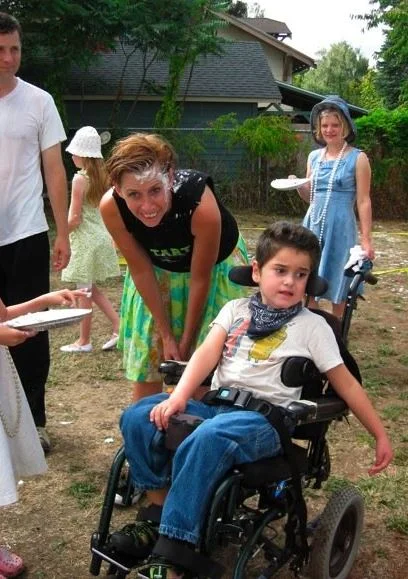The most fantastically awesome game event I ever attended was a pie fight party. My friend Marilyn hosted it as a fundraiser for some of her tenants who were members of Clowns Without Borders The pie fight arena didn’t have a whole lot of rules- it was a large section of grass marked off where you could toss a pie at anyone who was in the area. We had a table set up where you filled a pie tin with whipped cream or soap suds and added sprinkles and icing before entering the arena. From there, ridiculously great chaos, kids tossing pies at parents, parents getting pies in the face from clowns. One of my younger friends Henry came with his mom Chloe and making sure he was able to join in with the other kids was a priority for the day. Too many times party organizers and teachers have set him off to the side to watch what was happening rather than integrate his participation even at his own birthday.
For me the key to being inclusive is to ask questions, if this game doesn’t work for you, how can we fix it? Through conversations with Chloe I was able to figure out ways to adapt the game for Henry and most importantly ways to make the game FUN. Having someone else throw the pie for him wasn’t going to work, it was too passive. From our earlier play dates with our kids I knew that Henry was a big fan of catapults so I talked to some buddies about building him a pie tosser. This was an excellent scheme, my friends Greg and Ted never do anything by halves- they showed up to the party in a pickup which had an enormous wooden catapult they’d designed that would fling not one, not two but three pies- genius. Henry was not just able to play along, his adaptation became the hit of the party, shifting the dynamics from disability to inclusiveness with a tool everyone wanted and was able to use.
As I’ve been researching games for the residency I’ve been looking for other examples of games which integrate diversity into the rules and play. One of my favorite recent purchases is a deck of cards from native artist Rico Lanaat’ Worl who is part of the collective Trickster Co. Its a standard deck with Tlingit designs on the face cards and all card names written in Tlingit which is considered an endangered language. According to Wikipedia there are only 145 speakers left in Canada and 500 in the US. The deck has a pronunciation guide for the language as well as some phrases you might use in game play… ” ge’ i jeewu'” for “Do you have” and “Ast’ eix nagu'” for “Go fishing!” I was super happy to find the cards in a small fishing town in upstate Washington. They are a beautiful synthesis of the game play and design of two cultures. Here’s a great site for learning to pronounce your card numbers from the Sealaska Heritage organization.
I’d love to include other examples of inclusive games, send me links and I’ll include them in this post!


